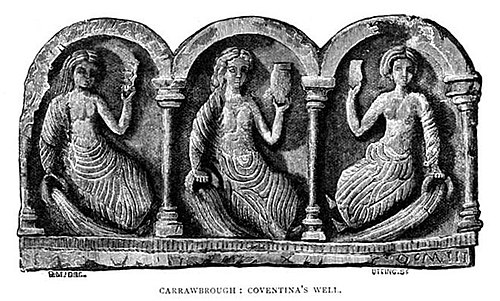Troubadournoun
An itinerant composer and performer of songs in medieval Europe; a jongleur or travelling minstrel.
Troubadournoun
One of a school of poets who flourished from the eleventh to the thirteenth century, principally in Provence, in the south of France, and also in the north of Italy. They invented, and especially cultivated, a kind of lyrical poetry characterized by intricacy of meter and rhyme, and usually of a romantic, amatory strain.
Troubadournoun
a singer of folk songs
Troubadournoun
a French medieval lyric poet composing and singing in Provençal in the 11th to 13th centuries, especially on the theme of courtly love.
Troubadournoun
a poet who writes verse to music.
Troubadour
A troubadour (English: , French: [tʁubaduʁ] (listen); Occitan: trobador [tɾuβaˈðu] (listen)) was a composer and performer of Old Occitan lyric poetry during the High Middle Ages (1100–1350). Since the word troubadour is etymologically masculine, a female troubadour is usually called a trobairitz.
Bardnoun
A professional poet and singer, like among the ancient Celts, whose occupation was to compose and sing verses in honor of the heroic achievements of princes and brave men.
Bardnoun
(by extension) A poet.
Bardnoun
A piece of defensive (or, sometimes, ornamental) armor for a horse's neck, breast, and flanks; a barb. (Often in the plural.)
Bardnoun
Defensive armor formerly worn by a man at arms.
Bardnoun
(cooking) A thin slice of fat bacon used to cover any meat or game.
Bardnoun
The exterior covering of the trunk and branches of a tree; the rind.
Bardnoun
Specifically, Peruvian bark.
Bardverb
To cover a horse in defensive armor.
Bardverb
(cooking) To cover (meat or game) with a thin slice of fat bacon.
Bardnoun
A professional poet and singer, as among the ancient Celts, whose occupation was to compose and sing verses in honor of the heroic achievements of princes and brave men.
Bardnoun
Hence: A poet; as, the bard of Avon.
Bardnoun
A piece of defensive (or, sometimes, ornamental) armor for a horse's neck, breast, and flanks; a barb. [Often in the pl.]
Bardnoun
Defensive armor formerly worn by a man at arms.
Bardnoun
A thin slice of fat bacon used to cover any meat or game.
Bardnoun
The exterior covering of the trunk and branches of a tree; the rind.
Bardnoun
Specifically, Peruvian bark.
Bardverb
To cover (meat or game) with a thin slice of fat bacon.
Bardnoun
a lyric poet
Bardnoun
an ornamental caparison for a horse
Bardverb
put a caparison on;
Bardnoun
a poet, traditionally one reciting epics and associated with a particular oral tradition
Bardnoun
Shakespeare.
Bardnoun
the winner of a prize for Welsh verse at an Eisteddfod
Bardnoun
a rasher of fat bacon placed on meat or game before roasting.
Bardverb
cover (meat or game) with rashers of fat bacon
Bard
In Celtic cultures, a bard is a professional story teller, verse-maker, music composer, oral historian and genealogist, employed by a patron (such as a monarch or noble) to commemorate one or more of the patron's ancestors and to praise the patron's own activities. Originally bards were a specific lower class of poet, contrasting with the higher rank known as fili in Ireland and Highland Scotland.





























